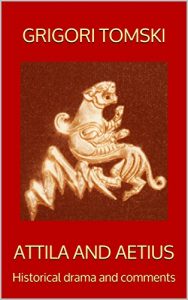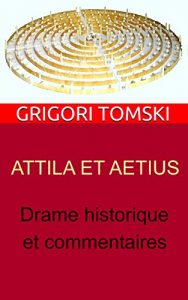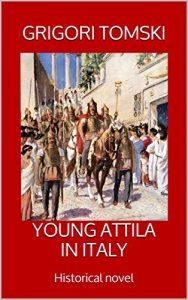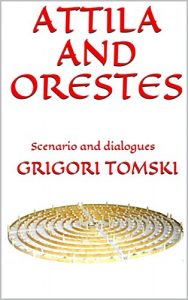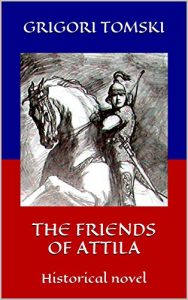Attila and his friends
This book is composed of theatrical drama "Attila and Aetius" and commentaries.
Aetius was the first great Roman friend of Attila. Then Orestes became much closer. Without Attila, Aetius and Orestes would not have existed as important politicians and military leaders.
The great esteem of his Roman friends from noble and proud families, the love of Princess Honoria evoke Attila more than his military actions.
He is kind to Pope Leo I and declares himself honored to have been visited "the wisest man in the world". Already in Gaul he was attentive to the bishops Anianus (Orleans) and Lupus (Troyes), who asked him to spare the lives of the inhabitants of their towns. He was moved by the prayers, inspired by the faith of Genevieve, and abandoned the siege of Paris.
"He had too many soldiers in the conquest of Gaul, too many soldiers in the Italian countryside. Too many men and too many horses to feed. Too many auxiliaries, too many allies, too many accomplices. These soldiers spoke too many different languages, from Greek to Finno-Ugrian. (Marcel Brion, Théodoric, roi des Ostrogoth, Tallandier, 1979, p. 12).
Attila could succeed in being a great conqueror without having many allies like Genghis Khan who with an army of less than 200,000 horsemen founded the greatest Empire in history.
Genghis Khan and Tamerlane "were greats military dictators who, by the size and duration of their empires, relegated Alexander and Napoleon to the rank of kinglets" (Historia spécial, N° 57 : La folle épopée des Mongols), p. 38).
But Attila was very different in his mentality and in his education:
"His intelligence, his ascendancy, his energy, his vices, his failings, in short his character, have determined his action, which could certainly have been different. If it had been otherwise, the face of the world would have been different. Having been what it was, it has changed the face of the world" (Maurice Bouvier-Ajam, Attila. Le Fléau de Dieu, Tallandier, 1982, p. 340).
Characters:
ATTILA – Prince of the Huns who became the Northern Emperor
AETIUS - general, who became the patrician of the Western Roman Empire
KERE-KO – wife of Attila
ELLAK – son ofAttila
MARC - officer of Aetius
BONIFACE – Roman general
GALLA PLACIDIA - regent of the Western Roman Empire
VALENTINIEN - Western Empiror, son of Galla Placidia
HONORIA - princesse, fille de Galla Placidia
EUGENE – friend of Honoria
JACINTE - eunich
LEON – Roman pope
ILDI-KO - fiancée d’Attila
SHAMAN - priest of Hun religion
AMBASSADOR OF CONSTANTINOPLE
AMBASSADOR OF ROME
ASPAR – Roman general
GAUDENTIUS – son of Aetius
OFFICER
This book is composed of theatrical drama "Attila and Aetius" and commentaries.
Aetius was the first great Roman friend of Attila. Then Orestes became much closer. Without Attila, Aetius and Orestes would not have existed as important politicians and military leaders.
The great esteem of his Roman friends from noble and proud families, the love of Princess Honoria evoke Attila more than his military actions.
He is kind to Pope Leo I and declares himself honored to have been visited "the wisest man in the world". Already in Gaul he was attentive to the bishops Anianus (Orleans) and Lupus (Troyes), who asked him to spare the lives of the inhabitants of their towns. He was moved by the prayers, inspired by the faith of Genevieve, and abandoned the siege of Paris.
"He had too many soldiers in the conquest of Gaul, too many soldiers in the Italian countryside. Too many men and too many horses to feed. Too many auxiliaries, too many allies, too many accomplices. These soldiers spoke too many different languages, from Greek to Finno-Ugrian. (Marcel Brion, Théodoric, roi des Ostrogoth, Tallandier, 1979, p. 12).
Attila could succeed in being a great conqueror without having many allies like Genghis Khan who with an army of less than 200,000 horsemen founded the greatest Empire in history.
Genghis Khan and Tamerlane "were greats military dictators who, by the size and duration of their empires, relegated Alexander and Napoleon to the rank of kinglets" (Historia spécial, N° 57 : La folle épopée des Mongols), p. 38).
But Attila was very different in his mentality and in his education:
"His intelligence, his ascendancy, his energy, his vices, his failings, in short his character, have determined his action, which could certainly have been different. If it had been otherwise, the face of the world would have been different. Having been what it was, it has changed the face of the world" (Maurice Bouvier-Ajam, Attila. Le Fléau de Dieu, Tallandier, 1982, p. 340).
Characters:
ATTILA – Prince of the Huns who became the Northern Emperor
AETIUS - general, who became the patrician of the Western Roman Empire
KERE-KO – wife of Attila
ELLAK – son ofAttila
MARC - officer of Aetius
BONIFACE – Roman general
GALLA PLACIDIA - regent of the Western Roman Empire
VALENTINIEN - Western Empiror, son of Galla Placidia
HONORIA - princesse, fille de Galla Placidia
EUGENE – friend of Honoria
JACINTE - eunich
LEON – Roman pope
ILDI-KO - fiancée d’Attila
SHAMAN - priest of Hun religion
AMBASSADOR OF CONSTANTINOPLE
AMBASSADOR OF ROME
ASPAR – Roman general
GAUDENTIUS – son of Aetius
OFFICER
